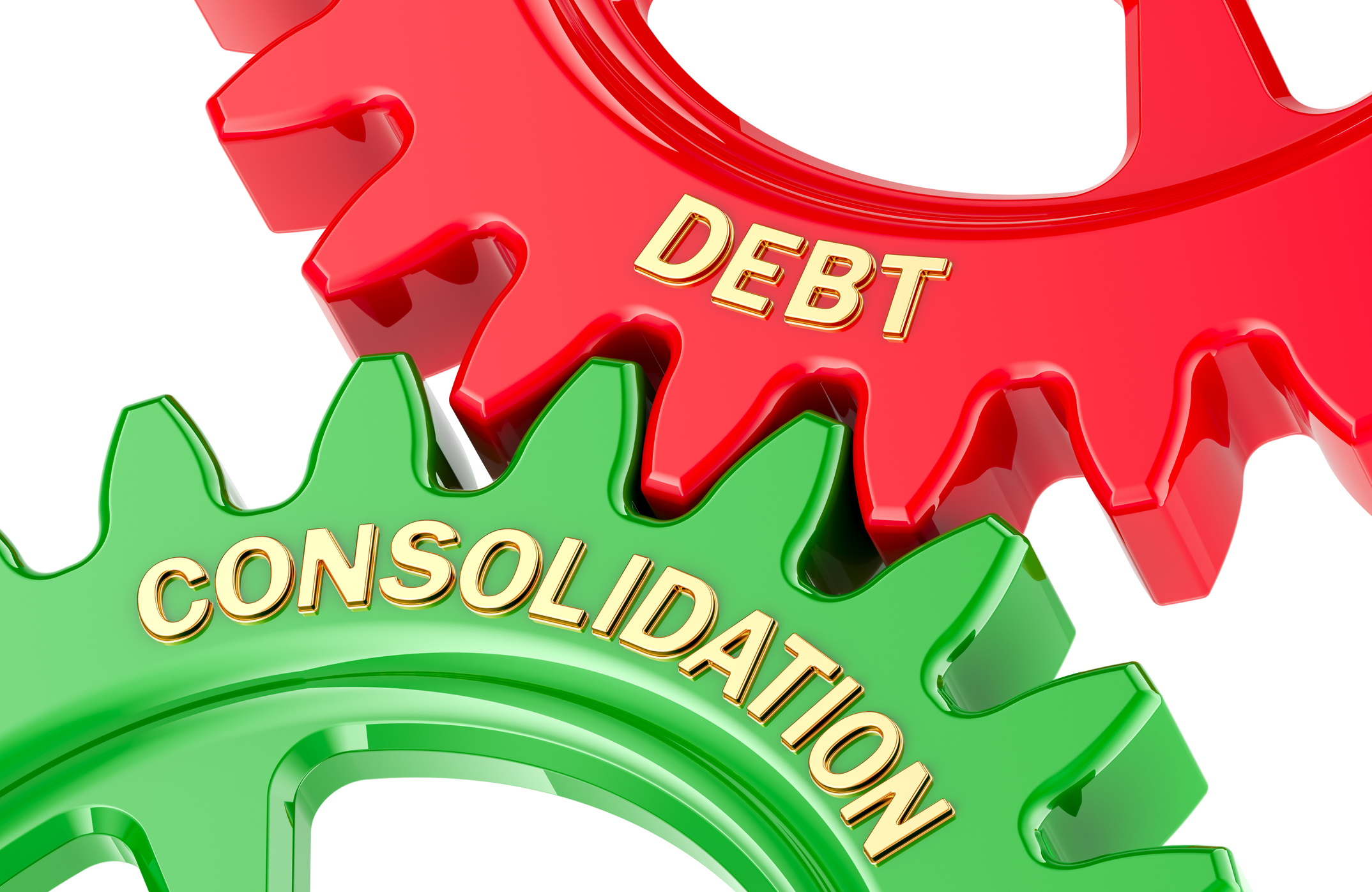Managing debt can feel overwhelming when you’re juggling high interest rates, multiple balances, and scattered due dates. Debt consolidation works by combining those debts into a single payment, usually at a lower interest rate. That can reduce the total interest you’ll pay and, in many cases, lower your monthly payment as well.
There are a few ways to accomplish debt consolidation, including a personal loan designed for debt consolidation purposes, a home equity line of credit (HELOC), or a balance transfer credit card. Each method has its own pros, cons, and eligibility requirements, but the goal of simplifying your payments and making your debt more straightforward to pay down, or ultimately eliminate it, is the same.
However, The Department of Financial Protection and Innovation offers a word of caution regarding consolidation, which is to do your research and only work with legitimate lenders, such as those found in our overview of the best debt consolidation companies.
Types of Debt Consolidation
There are several ways to consolidate your debt. Each has its own advantages and potential risks.
- Personal Loan for Debt Consolidation: Features a fixed interest rate, a set repayment term, and a predictable monthly payment. Most lenders limit pure debt consolidation applications to unsecured debts, such as credit card balances or medical bills. However, you can also use personal loans for virtually any legal purpose, which may, in some cases, include paying off secured loan debt.
- HELOC or Home Equity Loan: Secured by the equity you have in your home, these options often provide the lowest interest rates and longest repayment terms among loan-based consolidation solutions. You can use them to consolidate both unsecured debts and, in some cases, secured debts such as auto loans. The risk is that missing payments could put your home at risk.
- Balance Transfer Credit Card: Offers a 0% promotional APR for a limited time. This solution is generally best for smaller debts that you can pay off quickly. Balance transfer fees will apply and reduce your savings somewhat.
Choosing the right option depends on your credit score, income, and whether you’re comfortable using a secured product like a HELOC to consolidate your debt.
| Personal loan | Low fixed rates and predictable monthly payments. No collateral. |
| HELOC | Even lower rates, fixed payments, but your home is collateral. |
| Balance transfer card | Can eliminate interest payments if paid in the promo period. |
Related Article: How do Balance Transfer Credit Cards Work?
How Much Can I Actually Save With Debt Consolidation?
Because numerous variables are involved in personal finance and debt consolidation, determining your actual savings requires doing some math. However, the average consumer who follows through on debt consolidation can save, on average, between $2,000 and $5,000 per year and up to $20,000 or $30,000 over several years when large debts are involved.
The variables that will affect your savings amount are as follows:
- Qualifications & Credit Score: Better scores mean lower rates and higher savings
- Origination or Transfer Fees: Lenders may charge between 1% and 6% upfront, reducing your total savings.
- Loan Term: Longer repayment periods can reduce monthly payments but increase the total interest you’ll pay.
- Promotional Offer Limitations: Balance transfer cards only save significant money if you can fully pay off the debt before the promo rate expires.
Related Article: Are Balance Transfer Cards for Fair Credit Worth It?
Interest Rate Comparison
The biggest savings come from replacing high-interest credit card debt with a lower-rate loan or line of credit. Here’s how it could look with a $10,000 balance:
| Interest Rate | Monthly Payment | Total Interest (3 years) | Potential Savings | |
| Credit Card (22% APR) | 22% | $310 | $3,150 | $0 |
| Debt Consolidation Personal Loan | 10% | $323 | $1,600 | $1,550 |
| HELOC | 8% | $315 | $1,250 | $1,900 |
| Balance Transfer Card (0% APR for 18 months, then 20%) | 0% (during promo period) | $278 | $0 (if paid in promo period) | $3,150 |
Note that the table above provides rough estimates only. Your creditworthiness, origination and other fees, and situation specifics will all impact your actual results.
Example Calculation
You’ll notice in the table above that the monthly payment actually increased over simply paying the debt as it is. That scenario is common when dealing with debt consolidation. However, it’s not necessarily the norm. Consider the following scenario, in which
Suppose you have $15,000 in credit card balances at an average 22% APR. You’re paying about $400 per month, which means you’ll spend more than $13,000 in interest if you only make minimum payments over five years.
If you consolidate with a personal loan at 9% interest over the same five-year period, your monthly payment drops slightly while still saving thousands in interest.
| Initial Balance | APR | Monthly Payment | Total Interest over 5 years | |
| Credit Cards | $15,000 | 22% | $400 | $13,200 |
| Consolidation Loan | $15,000 | 9% | $380 | $4,800 |
Debt Not Eligible for Consolidation
Not every debt balance can be rolled into a debt consolidation loan. Federal student loans, some types of medical bills, and accounts already in collections won’t likely qualify for dedicated debt consolidation lending.
Additionally, secured debts, such as mortgages or auto loans, aren’t usually eligible for traditional debt consolidation loans, as lenders typically focus on unsecured balances, like credit card debt. However, secured options like a home equity loan or HELOC may allow you to combine secured and unsecured debts into a single repayment plan.
The best personal loans not directly associated with dedicated debt consolidation and private student loan refinancing can offer solutions where these limitations exist.
Related Article: What Is Online Loan Prequalification?
How Long Does Debt Consolidation Take to Work?
Consolidation can begin helping almost immediately, but the long-term benefits depend on how you manage the account. Depending on what you mean by “work,” the timeline looks different. For instance, if you’re looking for immediate peace of mind, debt consolidation can reduce stress right away by simplifying your bills into a single payment.
If your goal is financial improvement, the full process usually takes several years to complete, depending on your loan term. Hard inquiries from applying for your debt consolidation solution generally stop affecting your score within 12 to 24 months, and you can start to see a better debt-to-income (DTI) ratio within the first year or two as your balance declines over time.
Immediate Benefits
- One simplified monthly payment
- Fewer due dates to track
- Predictability
Long-Term Benefits
- Lower interest rates and shorter pay-off time
- You’ll have a precise end date
- Potentially significant money savings
Impact on Credit Scores
- Making on-time payments consistently can help improve your credit over time.
- Applying for new credit will temporarily affect your credit scores, but the impact can lessen over time with responsible loan repayment.
Related Article: How Does Debt Consolidation Affect Your Credit?
Is Debt Consolidation Worth It?
Whether debt consolidation is worth it depends on your goals and financial situation. For many, consolidation is a smart way to simplify bills and save money. However, it’s essential to weigh the pros and cons. Fees and credit score impacts can reduce some of the benefits, so understanding both the advantages and disadvantages will help you decide if it’s your next best move.
Pros and Cons of Debt Consolidation
Pros
- Lower interest rates compared to high-interest credit cards
- Easier to manage with one monthly payment
- Can speed up debt payoff
- On-time payments can help improve your credit score over time.
Cons
- Origination fees or balance transfer fees may apply, which reduce your overall savings.
- Applying for new credit can trigger a hard inquiry, which can temporarily affect your credit score.
- Risk of overspending if old credit accounts stay open.
When to Consider Other Options Instead
If you’ve fallen far behind and can’t qualify for a debt consolidation loan, you may need to consider alternatives. Bankruptcy is one possibility, but it has lasting consequences. Compare debt consolidation options side-by-side with bankruptcy before making your decision.



